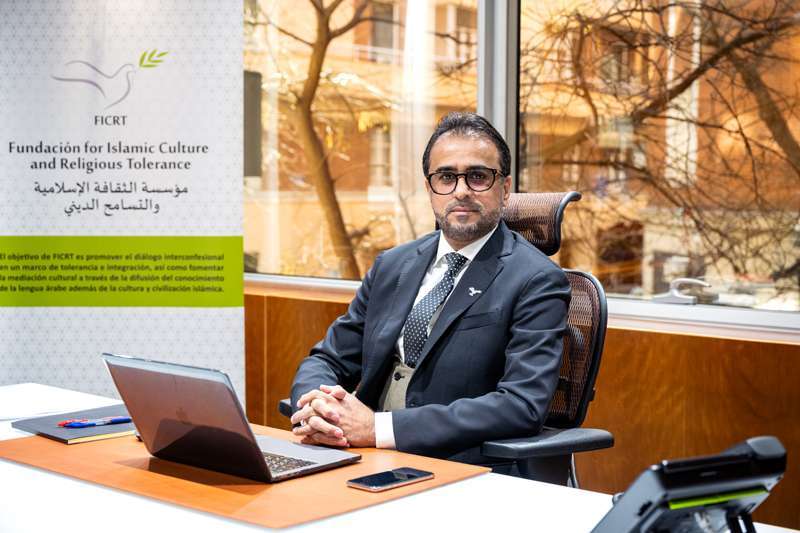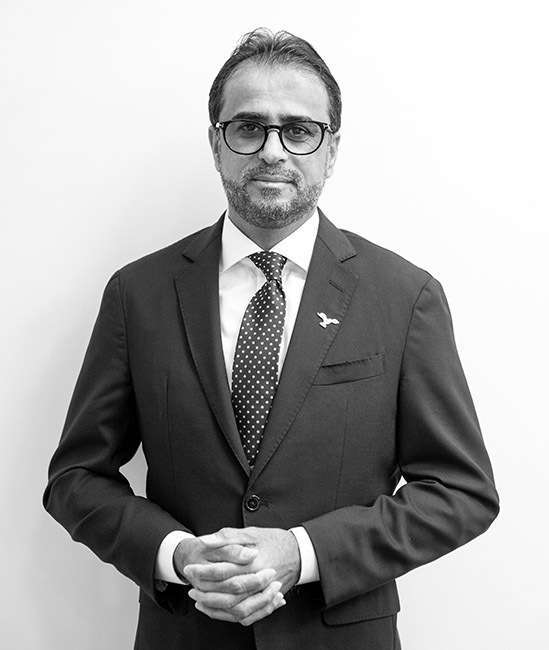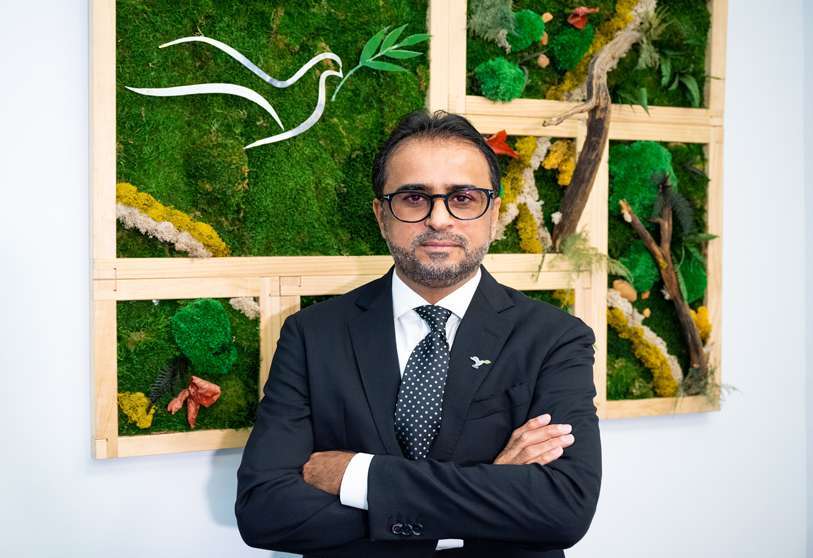Jumaa AlKaabi: "We believe in culture as a way to spread the values of peace, human fraternity and social justice"

At a particularly critical time for international peace, it is necessary to put the spotlight on organisations working for dialogue, peaceful coexistence and understanding between nations. This is the case of the Foundation for Islamic Culture and Religious Tolerance (FICRT), a Spanish organisation whose objectives coincide with those set out in the Document on Human Fraternity, signed in 2019 in Abu Dhabi by the highest Muslim and Catholic religious authorities. We spoke to its president, Jumaa AlKaabi.
The FICRT Foundation was set up five years ago. What were the aims for which it was set up?
The Foundation was set up as such in April 2017 and its objectives are to spread the culture of peace and tolerance; to encourage understanding between different cultural and religious spheres; and to promote the values of human brotherhood. These are universal and undoubtedly ambitious objectives, which we are approaching with small but decisive steps, through both academic (forums, congresses, seminars, publications...) and social actions. We cannot forget that we are part of civil society and we work from this sphere.
The name of the Foundation refers to tolerance, religion and culture. They are different fields, but with a common goal.
It is true: culture serves to unite people, it permeates our lives. We all have at home some image, some souvenir, some figure from other cultures, which we have received as a gift or brought back from a trip. Or we enjoy the gastronomy of other countries in Chinese, Mexican, Italian, Arab, Indonesian restaurants... Not to mention decoration, painting, art in general or music. They are all means of bringing people together, of bringing people closer and allowing them to get to know each other, to relate to each other and to understand each other better.

During the last two years we have gone through a very complicated period, due to the pandemic, in which public activity has come to a halt. Now that it seems to be over, how have you resumed your activities and what events do you have on the agenda?
It has been a complicated period for personal relationships. We have learned new rules of social behaviour, with distance, masks. Fortunately, we are getting back to normal. In our case, the Foundation's annual activity is based on four main pillars: the International Day of Human Fraternity (4 February); the Forum on Islam-Christian Dialogue and the Abrahamic Family; the International Day of Tolerance (16 November); and the World Arabic Language Day (18 December). These four pillars coincide with the four main events we celebrate, but we do not stop there. There are many other activities throughout the year, such as the cultural exchange programme with the United Arab Emirates, solidarity initiatives, cultural activities, book translations, publications...
The world is experiencing a period of escalating warfare, diplomatic disagreements, refugee crises... In such an environment, what role should civil society and religions play in building bridges and fostering dialogue?
A very important role indeed: societies are breeding grounds for different cultures and religions, so they must find ways to foster coexistence, understanding and respect for others. At our Foundation, we believe in the role of culture as a means to spread the values of peace, human fraternity and social justice. Cultural diplomacy, in this sense, is sometimes more effective than politics.

The FICRT has underlined the importance of such a symbolically charged act as the signing of the Document on Human Fraternity between Pope Francis and the Grand Imam of Al Azhar, Ahmad Al-Tayyeb, on 4 February 2019. What is the real significance of this document?
The Document on Human Fraternity is fundamental, it is a turning point for interreligious dialogue and a declaration of intent signed by two religious leaders such as Pope Francis and the Grand Imam of Al Azhar. Its vocation is to serve as a guide for the formation of new generations as bearers of good and peace, and to make young people aware of their mission in defence of the oppressed and disadvantaged. Hence, one of our four annual pillars in terms of the Foundation's activities is the celebration of the International Day of Human Fraternity, which commemorates the signing of this important document in Abu Dhabi on 4 February 2019.
Last May, FICRT organised the Cordoba Forum on interreligious dialogue. What conclusions were drawn from that meeting?
This forum aims to take up the baton of the Islam-Christian dialogue that began in Cordoba in the 1970s and extend it to the Abrahamic family and other religions. The Cordoba Forum concluded with the presentation of a Manifesto, which takes up the cultural and spiritual heritage of Abraham, based on five points: invoking personal and collective responsibility in favour of life, peace and justice; recognising war as the greatest threat to human life and putting the means to avoid it; promoting a new international order with just laws; urging religions to transmit a message of respect for life and peace; and fostering dialogue between different peoples, cultures and religions. Personally, I am very satisfied with the result and we are already working on next year's edition.
The construction of a space for coexistence between the three great Abrahamic religions (Islam, Christianity and Judaism) is not only a theoretical aspiration, but a real project that is being developed in Abu Dhabi. What can you tell us about it?
In Cordoba we were able to learn first-hand about the experience of the Abrahamic Family House in Abu Dhabi, a project that brings together a mosque, a synagogue, a church and a common cultural and educational space in the same space. It is a real, physical space where the ideal conditions exist for interreligious dialogue, understanding and coexistence to develop, and proof that these initiatives are not just good intentions or theoretical projects, but can be put into practice.
Such initiatives to promote coexistence and mutual understanding come from the United Arab Emirates. What is it about this country, what is its formula for being a pioneer in this field?
Despite being a young country, the UAE has a centuries-long tradition as a haven for all religions, which have been able to practice freely, tolerantly and hospitably for thousands of years. Today, it is a modern country, with more than 80% expatriates, of 192 nationalities. It is not surprising that in such an environment, projects such as the Abrahamic Family House are springing up, also thanks to the support of the Emirati government. For example, the United Arab Emirates is one of the first countries in the world to have a Ministry of Tolerance.
Precisely, the Foundation that you preside over organises a cultural exchange that allows Emirati researchers and students to visit Spain and learn about its culture and history, and Spanish university students to deepen their knowledge of the United Arab Emirates.
At the FICRT Foundation, we believe that the best way to promote dialogue and mutual understanding is to create the necessary conditions for young people, students, researchers and university students from both Spain and the United Arab Emirates to broaden their knowledge. This is why we have set up this cultural exchange programme, where they have the opportunity to get to know another culture in situ and learn more about the history, art and society of the other country. In October, we will receive a series of guests from the Emirates, who will visit several Spanish cities as part of this programme.

Speaking of solidarity, an issue that since 2020 is becoming more necessary than ever: the Foundation collaborates in solidarity projects that also unite the different religious denominations.
This solidarity food distribution project arose during the pandemic, in response to a pressing need on the part of the most disadvantaged sector of society. We are working hand in hand with the Sheikh Zayed bin Soltan Mosque in Granada, which is responsible for the initiative. The recipients of these food boxes are non-governmental organisations, charities, mosques and parishes in various Spanish cities. Moreover, as we have observed that the needs of many families have not disappeared, we have extended this programme and turned it into an annual project, always hand in hand with the mosque.
Finally, in the cultural field, what are the projects that the FICRT Foundation is currently working on?
As I have already said, culture is a very important means of bringing people together and fostering mutual understanding. That is why we are committed to organising various cultural activities, as we have done in the past with the Book Night or Poets for Fraternity. We want to create in our headquarters a permanent space dedicated to culture, art, dialogue, gatherings, reading, with works of art and various activities open to the public. All of this, in line with one of our mottos: from society for society.









